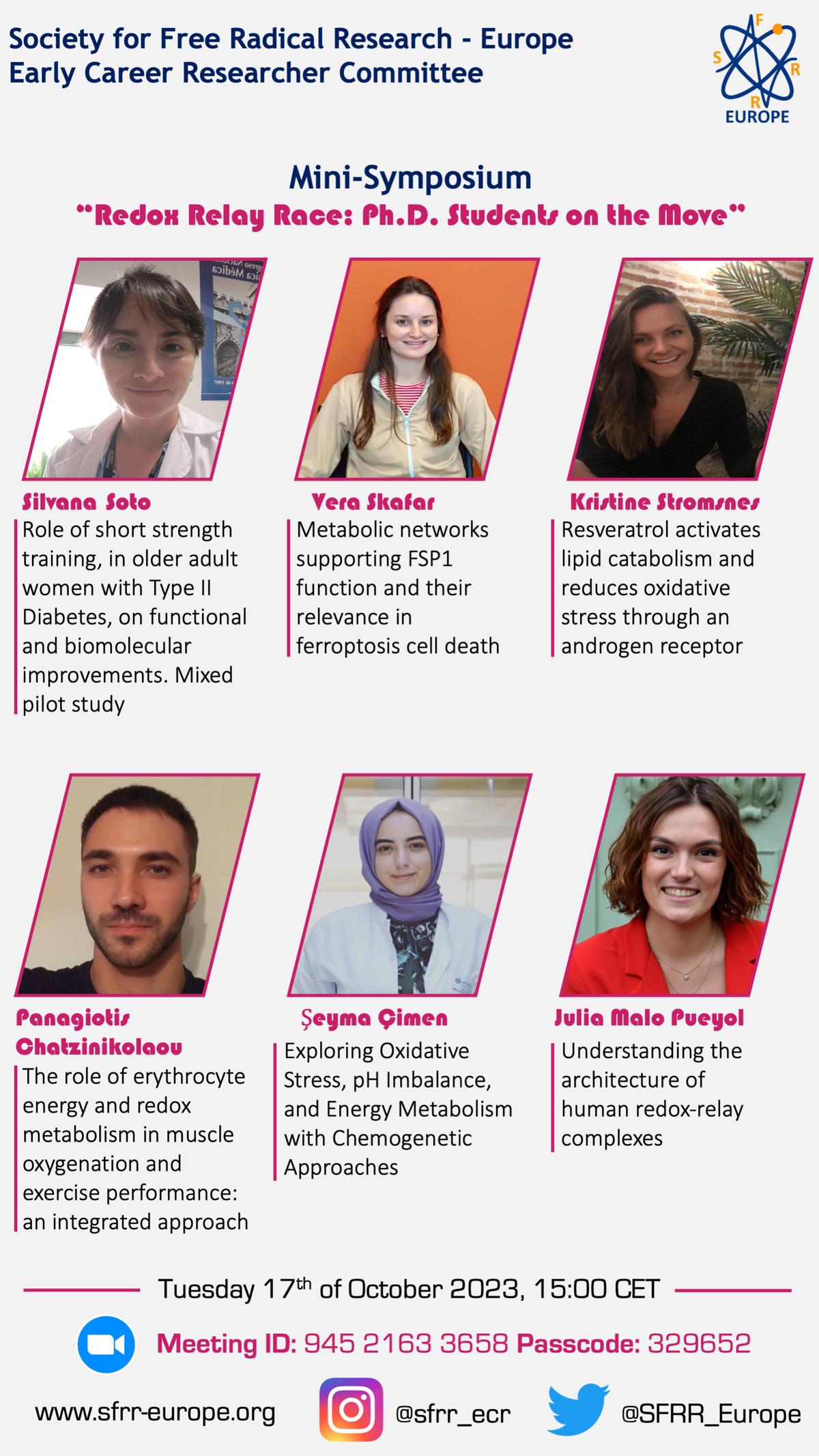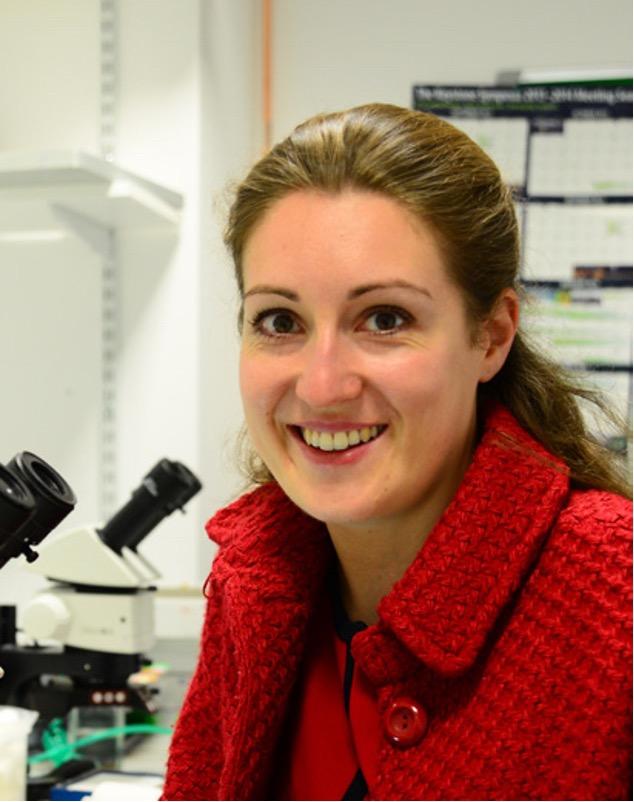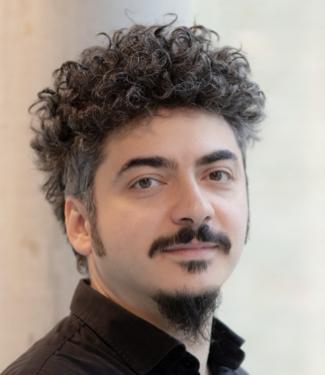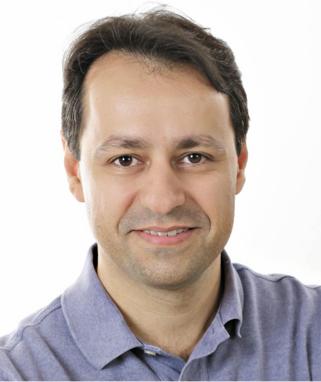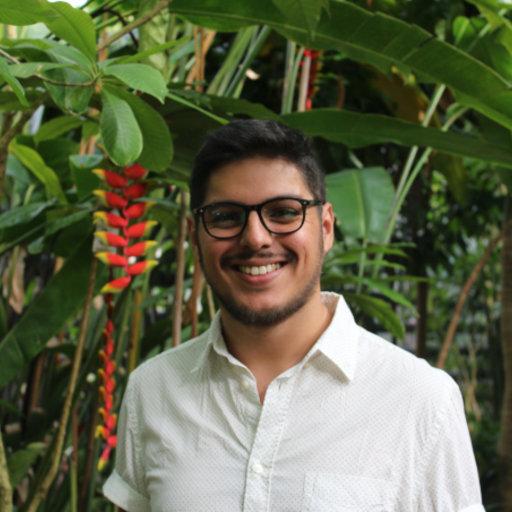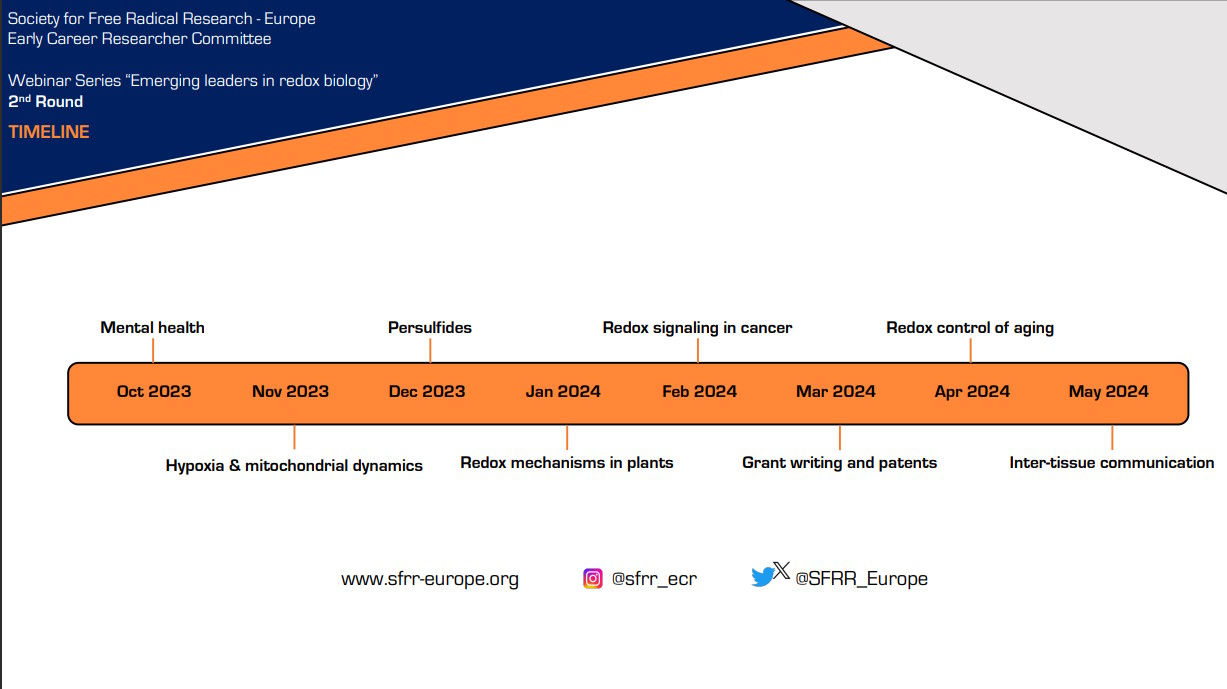
Webinar series 2nd ROUND
“Emerging leaders in redox biology”
The ECR subcommittee is hosting the “Emerging Leaders in Redox Biology” webinar series every first Tuesday of the month at 15:00 CET. Recordings of past webinars can be found in the society’s intranet pages.
WEBINARS TIMELINE
9 April 2024
Redox control of aging
9 April 2024
7 May 2030
Inter-tissue communication
9th April 2024 at 15:00 CET
Our next webinar will be on 9th April 2024 at 15:00 CET on the topic “Redox control of aging” featuring Daphne Bazopoulou and Helena Cochemé.

The impact of early-in-life redox signaling in health, aging and disease
Daphne Bazopoulou, PhD
Biology of Stress and Aging Lab, Department of Biology, University of Crete, Greece
Daphne has been at the University of Crete as a student (B.Sc., M.Sc. and Ph.D.) and since 2021 as an Assistant Professor and Group Leader (Biology of Stress and Aging Lab). In between the two, she consecutively held 2 postdoc positions at the University of Michigan (Departments of Mechanical Engineering and Molecular, Cellular & Developmental Biology) and embarked on an interdisciplinary journey of exploring organismal aging and mechanisms that dictate it and co-founding a spin-off. Her studies in C. elegans revealed that inter-individual differences in developmental Reactive Oxygen Species (ROS) levels contribute to variations in stress resistance and lifespan and provided the first demonstration of a redox-regulated histone methylation event. Daphne has also worked with microfluidic-based platforms for exploring the effects of aging and age-related pathologies in neurons and performed chemical screens for identifying compounds that delay or reverse the age-dependent decline in the functionality of the C. elegans nervous system. Her team is currently involved in the study of ROS as adaptive signals for improving homeostasis, stress resistance and longevity and the impact of environmental stressors on organismal health and survival.
Redox Metabolism Group, MRC Laboratory of Medical Sciences, London, United Kingdom
Helena is a UKRI Investigator at the MRC Laboratory of Medical Sciences (LMS), where she leads the Redox Metabolism group. She is also an Honorary Senior Lecturer at Imperial College London. She received her PhD in Biochemistry from the University of Cambridge in 2006, at the MRC Mitochondrial Biology Unit in the group of Prof. Mike Murphy, where she first developed her interest in mitochondrial oxidative stress and redox biology. She started working with Drosophila in 2007 as a post-doc at the Institute of Healthy Ageing, UCL in the laboratory of Prof. Linda Partridge. As part of her postdoctoral work, she characterized the mitochondria-targeted H2O2 probe, MitoB, and demonstrated that mitochondrial H2O2 levels increase in vivo with age. She established her own independent group at the LMS in 2013 and was promoted to Programme Leader Track in 2018. Research in the Cochemé lab is focused on the impact of redox signaling in aging and metabolic disorders, mainly using Drosophila as an in vivo model system. She is particularly interested in dissecting the role of redox-responsive cysteines in regulating survival, by applying a combination of redox proteomic and genetic knock-in approaches. Ultimately her goal is to uncover novel evolutionary conserved pathways and processes implicated in aging as potential therapeutic targets for health and longevity benefits.
LATEST SPEAKERS
5th March 2024 at 15:00 CET
“Grant writing support for ECRs” featuring Isabel Fabregat.

Orientation, guidance and tips and tricks for successful grant writing for early career scientists
Isabel Fabregat, PhD
Bellvitge Biomedical Research Institute (IDIBELL), Barcelona, Spain
Her research line begins at the Faculty of Pharmacy, Complutense University (UCM), Madrid (1991) after a postdoctoral stage in Dr. Enrique Rozengurt’s Lab at the Imperial Cancer Research Foundation (ICRF) in London (1989-1990). Searching for new regulatory elements of hepatic cell proliferation and differentiation, Dr. Fabregat found that the Transforming Growth Factor beta (TGF-β) induced cell death in hepatocytes, and she was the first to propose TGF-β as an inducer of intrinsic apoptosis in hepatocytes, a process that required the production of reactive oxygen species. In September 2005, Dr. Fabregat moved to IDIBELL as a senior investigator, continuing with the same line of research. During the last few years, Dr. Fabregat’s group has also provided new data about how the liver tumor cell escapes from the apoptosis induced by TGF-β. In collaboration with different European groups, Dr. Fabregat created in 2013 a consortium dedicated to analyzing the potential of the TGF-β pathway as a therapeutic target in liver diseases (IT-LIVER: Inhibiting TGF-beta in Liver Diseases). Since 1997, Dr. Fabregat has received continuous national funding from the Plan Estatal de Investigación, Spain, as PI in all the projects, as well as funding from Europe in Marie Curie (FP7) and COST Actions. In recent years, her group has also been funded by private foundations and companies.
6th February 2024 at 15:00 CET
Webinar on the topic “Redox signaling in cancer” featuring Salvatore Rizza and Hamed Alborzinia.
Redox Biology Group, Danish Cancer Institute, Copenhagen, Denmark
Salvatore Rizza is a senior researcher in the lab of Giuseppe Filomeni at the Danish Cancer Institute. His research has centered on redox stress and specifically on the study of GSNOR, a pivotal enzyme regulating the levels of proteins covalently modified by the cellular messenger nitric oxide (NO). In 2016, Salvatore uncovered a crucial link between the absence of GSNOR and mitochondrial respiration, pinpointing SDH as a vulnerability in a subset of tumors. Building on this, he shifted focus to GSNOR dynamics during cell senescence and aging, elucidating the age-dependent GSNOR decline orchestrated by DNA methylation and demethylation reactions. This decline was intricately tied to mitochondrial aberrations, shedding light on the aging process. Further expanding this exploration, he delved into the interplay of NO-signaling and mitochondria homeostasis in immune cells and discovered that under oxidative stress, GSNOR induction led to decreased S-nitrosylation levels, boosting mitophagy and supporting the viability of immune cells facing excessive oxidative and nitrosative stress during activation. In 2023, Salvatore and his colleagues unveiled the prevalence of GSNOR deficiency in most solid tumors, triggering FAK1 hyperactivation and promoting anchorage-independent cell growth. This insight has significant therapeutic implications, as FAK1 inhibitors emerge as potential agents to exploit this vulnerability, effectively positioning GSNOR as a novel therapeutic efficacy marker in cancer research.
Heidelberg Institute for Stem Cell Technology and Experimental Medicine (HI-STEM GmbH), Heidelberg, Germany
Division of Stem Cells and Cancer, German Cancer Research Center (DKFZ), Heidelberg, GermanyRegulation of cell adhesion and anoikis by S-nitrosylation
Hamed Alborzinia graduated in veterinary medicine from Shiraz University (Iran) before enrolling in the Molecular Biology Ph.D. program at Heidelberg University. During his doctoral studies in Heidelberg, he utilized bioanalytical techniques to investigate cancer cell metabolism. In 2018, he joined the Heidelberg Institute for Stem Cell Technology and Experimental Medicine (HI-STEM) and the Division of Stem Cells and Cancer at the German Cancer Research Center (DKFZ) within the lab of Prof. Andreas Trumpp in Heidelberg, Germany. As a Postdoctoral researcher, his primary focus has been on unraveling the metabolic properties of cancer cells, particularly in relation to emerging forms of cell death, such as ferroptosis. Recently appointed as a group leader at HI-STEM/DKFZ, Hamed's main objective is to explore cell death mechanisms in cancer cells, with a specific emphasis on drug resistance. His research group is actively involved in uncovering the novel metabolic cell death pathway of ferroptosis, with the ultimate aim of identifying therapeutic strategies for challenging cancers, including those characterized by MYC deregulation and drug tolerance.
Webinar of 9th January 2024
Webinar of 9th January 2024 on the topic “Redox mechanisms in plants” featuring Jan-Ole Niemeier and José Manuel Ugalde
2023 WEBINARS

Previous speakers:
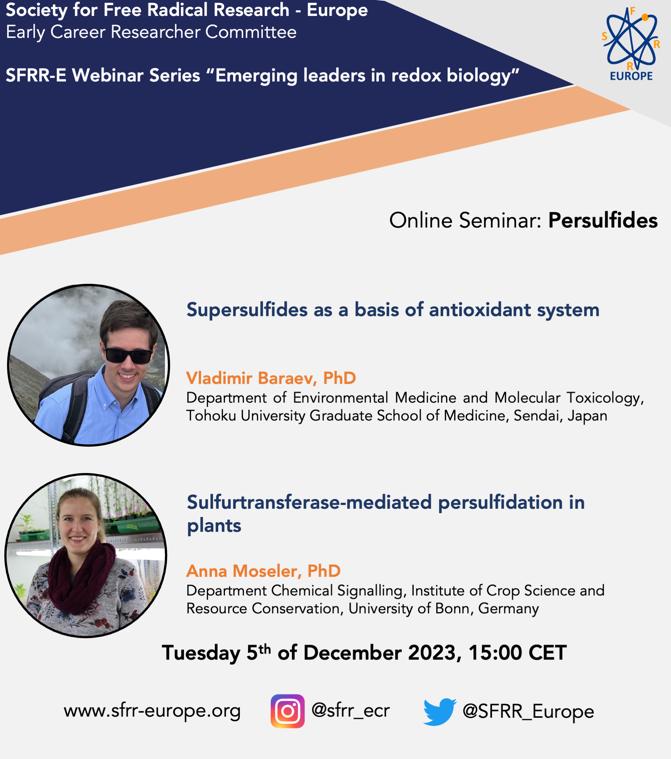
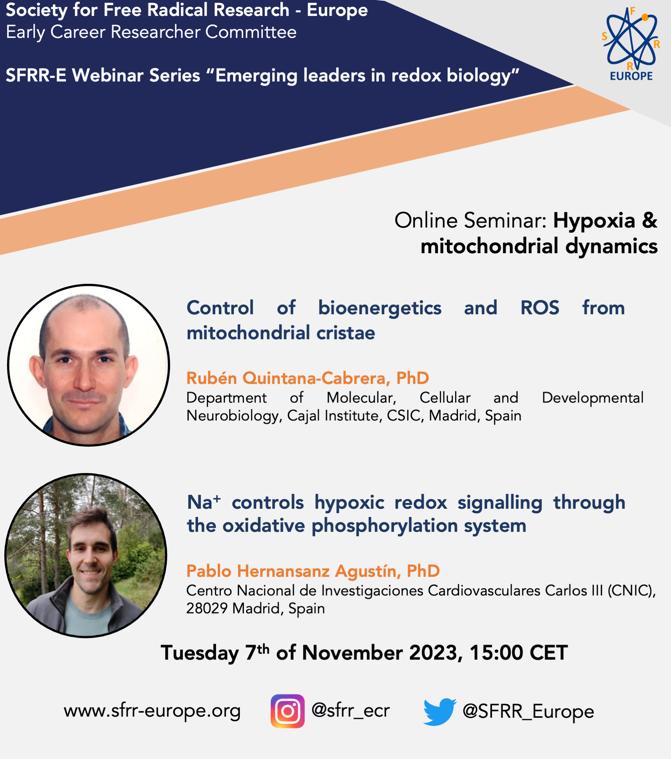
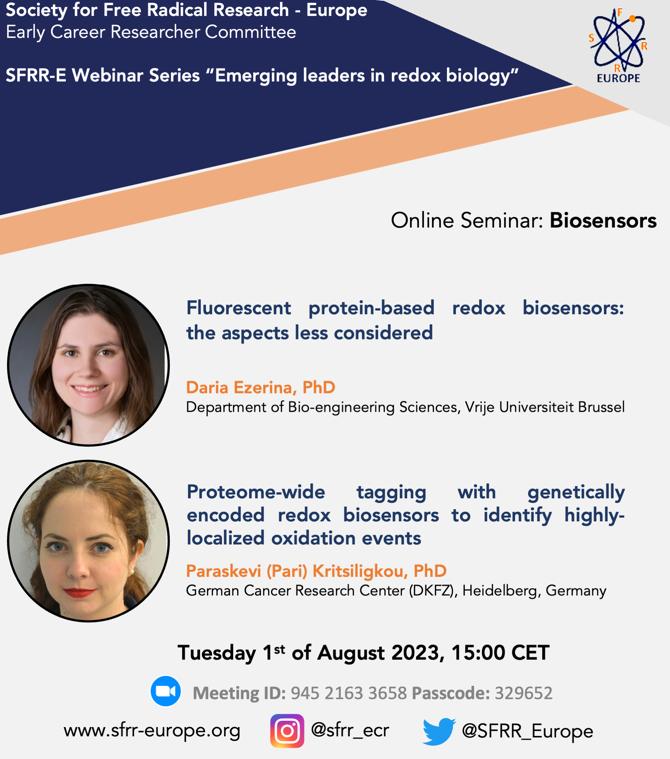
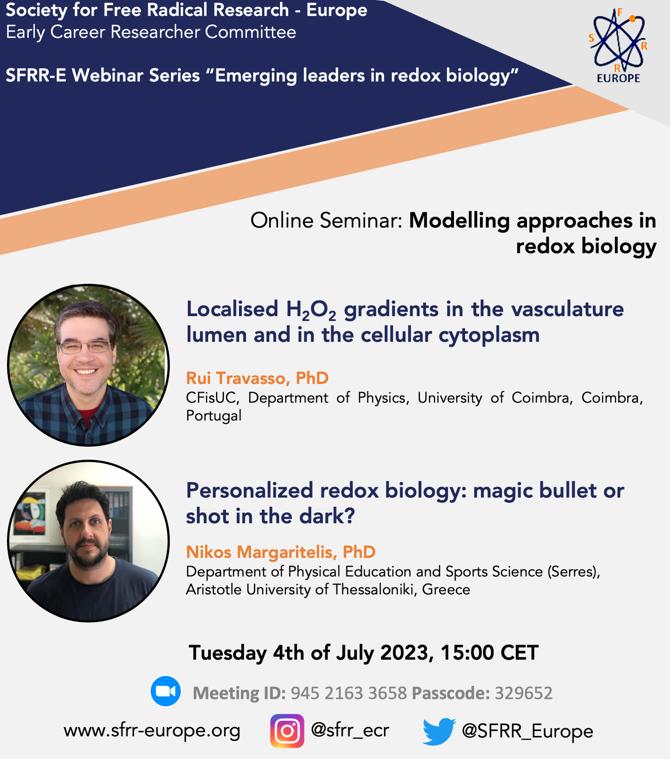
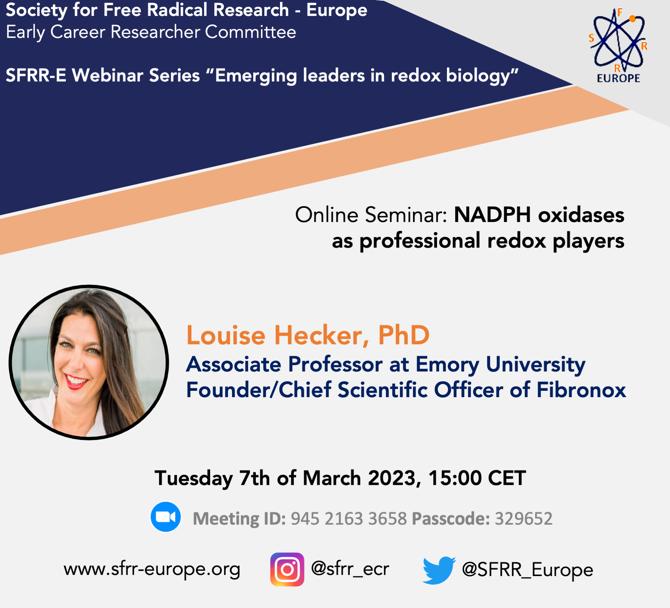
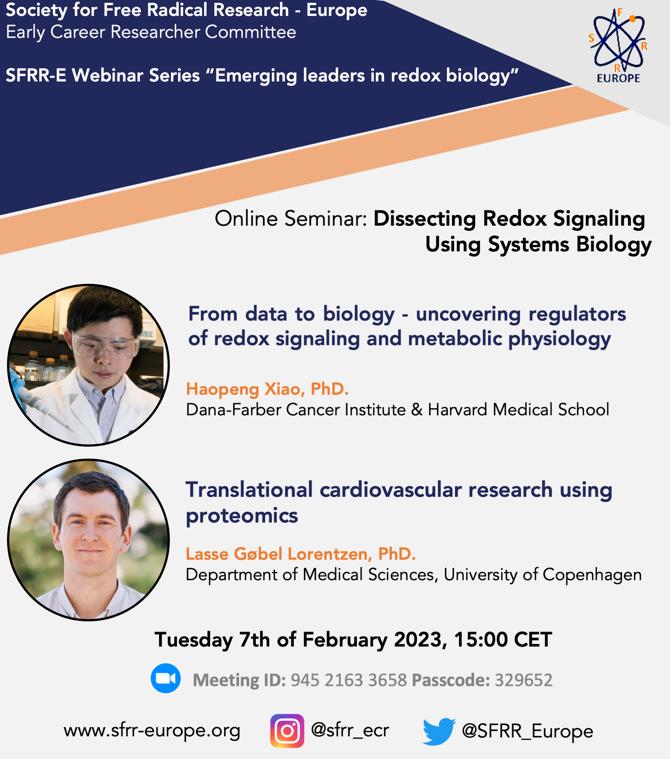
Redox Relay Race: PhD students on the move
The ECR subcommittee also hosted in 2023 the first PhD student mini Symposium to give opportunities to PhD students to present their work. The selection of the speakers was done based on a short video presentation about their work:
